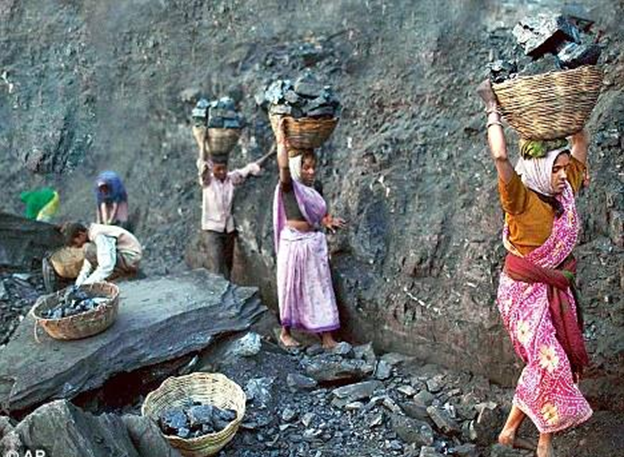Supreme Court Sorts Out Coalgate, Cancels 214 Allocations
Supreme Court to the rescue

NEW DELHI: In a landmark judgement the Supreme Court sought to make right of the Coalgate scam by cancelling 214 of the 218 coal blocks allocated by successive governments since 1993, rejecting the government’s plea to save 46 of the allocations.
It has given six months to the companies to wind up their operations. Four public sector coal blocks have been spared, two belonging to the Steel Authority of India and two with the National Thermal Power Corporation. Coal India Limited has been asked to take over the operational blocks for six months with the Attorney General Mukul Rohatgi maintaining that the government will be “free to auction coal blocks post March 31,2015.”
"The Supreme Court has also asked the companies running the coal blocks for the next months to pay Rs.295 per tonne of coal they extract. They also have to pay the same amount per tonne for the coal they have already extracted from the blocks," senior Supreme Court lawyer Prashant Bhushan said.
In a landmark verdict last month, the apex court had said that licences to the blocks were illegal and arbitrary, and a transparent process for their bids was not followed. A bench headed by Chief Justice RM Lodha had said,” The Screening Committee has never been consistent, it has not been transparent, there is no proper application of mind, it has acted on no material in many cases, relevant factors have seldom been its guiding factors, there was no transparency and guidelines have seldom guided it.”
The allocation of the coal blocks to various companies had been at the centre of what has come to be known as the Coalgate scandal, said to cost the exchequer Rs.1.86 lakh crore according to a 2012 audit report.
The CBI, which is investigating the multi-crore scam, has alleged that for several years, mining licences were given arbitrarily to private companies without a transparent bidding process. Former Prime Minister Manmohan Singh too faced the flak as he had held the coal portfolio for a while.
This is one in a series of judgements and observations by the Supreme Court where it has sought to highlight the provisions of the law and the Constitution. For instance the apex court expressed concern only a few weeks ago about the Leader of the Opposition post in the Lok Sabha remaining vacant. The judges said that this was an important position as it “conveys a voice different from the government’s” in what was a basic reminder about the importance of the LOP in a functioning democracy as it is involved in the selection of important heads of institutions such as the Lokpal members.
The Supreme Court also tried to diffuse an unnecessary controversy over the validity of Article 370 by dismissing a petition challenging the illegal validity of the Act that gives special status to Jammu and Kashmir. A bench of Chief Justice R.M.Lodha, Justice Pinaki Chandra Ghose and Justice Rohinton Fali Nariman dismissed the plea by Kumari Vijayalakshmi Jha, who contended that Article 370 was a temporary provision that lapsed with the dissolution of the state's constituent assembly in 1957.Dismissing the plea, the court wondered what made the petitioner raise the issue after Constitution of India came into force in 1950 and Jammu and Kashmir's Constitution in 1956.
The coalgate ruling comes on the heels of the apex courts decision to consider a plea for hearing allegations against Central Bureau of Investigation Director Ranjit Sinha without the name of the whistleblower being revealed. A bench headed by Justice H L Dattu sought the assistance of the Special Public Prosecutor(SPP), appointed by it for trial in 2G cases, saying that any order passed by it may have ramifications on multi-crore scam cases.
The bench agreed to hear the plea of NGO Centre for Public Interest Litigation which pleaded for recall of its earlier order asking it to reveal the name of the whistleblower in a sealed envelope.It turned down the plea of the CBI Director's counsel Vikas Singh that the apex court should not hear the case any further in view of the NGO refusing to disclose the name of "mole" who leaked the documents, including CBI file notings and the register. The lawyer representing the NGO Dushyant Dave and Prashant Bhushan apologised to the court for their inability to reveal the name of the whistleblower, pleading that the court withdraw its earlier order on disclosing the name.
"No, no. We are sorry Mr Vikas," the bench said when the CBI counsel pleaded that no order should be passed and he should be heard before passing any direction.Submitting that there has been no interference on his part in any of the cases probed by CBI, Sinha pleaded that continuance of this case even for a single day would cause more public harm and would affect 2G cases.
The bench, however, said, "We don't believe so."
The court directed that all documents, including CBI files and the visitors' list register pertaining to the allegations against the top cop, be handed over to SPP Anand Grover, who will go through all the information and assist the court on the next date of hearing on October 10.
The ruling, if it goes against the CBI director who has been accused of entertaining industrialists at his residence in clear conflict of interest, will again set a precedent flying in the face of efforts by the executive in the past to protect such officials.



